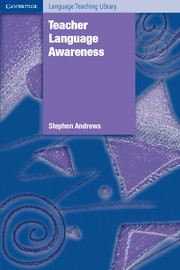Book contents
- Frontmatter
- Contents
- Acknowledgements
- Introduction
- Prologue: The challenge of being ‘language-aware’
- 1 Language Awareness, ‘Knowledge About Language’ and TLA
- 2 TLA and the teaching of language
- 3 TLA and the ‘grammar debate’
- 4 TLA and teachers' subject-matter cognitions
- 5 TLA and pedagogical practice
- 6 The TLA of expert and novice teachers
- 7 TLA and the native-speaker and non-native-speaker debate
- 8 TLA and student learning
- 9 TLA and teacher learning
- Epilogue: TLA and teacher professionalism
- Appendix
- References
- Index
- Publisher's acknowledgements
1 - Language Awareness, ‘Knowledge About Language’ and TLA
Published online by Cambridge University Press: 30 July 2009
- Frontmatter
- Contents
- Acknowledgements
- Introduction
- Prologue: The challenge of being ‘language-aware’
- 1 Language Awareness, ‘Knowledge About Language’ and TLA
- 2 TLA and the teaching of language
- 3 TLA and the ‘grammar debate’
- 4 TLA and teachers' subject-matter cognitions
- 5 TLA and pedagogical practice
- 6 The TLA of expert and novice teachers
- 7 TLA and the native-speaker and non-native-speaker debate
- 8 TLA and student learning
- 9 TLA and teacher learning
- Epilogue: TLA and teacher professionalism
- Appendix
- References
- Index
- Publisher's acknowledgements
Summary
Introduction
The aim of the present chapter is to provide a context for the book's focus on TLA: conceptually, by setting TLA within the broader framework of Language Awareness more generally, and historically, by situating the growing interest in TLA within the context of changing perspectives on grammar and L2 teaching. The chapter begins by briefly outlining the emergence of the Language Awareness ‘movement’, and examining what is understood by the terms ‘Language Awareness’ and ‘Knowledge About Language’ (KAL) – the associated phrase which appears in much of the literature, particularly that concerned with the National Curriculum for English Language in the UK (see, e.g., Carter, 1990). The chapter then discusses the central concern of the Language Awareness ‘movement’ with explicit knowledge about language, and with the relationship between explicit and implicit knowledge. The debate about the interface between these two types of knowledge is linked to parallel discussions about declarative/procedural knowledge and learning/acquisition, as well as the related concept of consciousness. The relationship between Language Awareness, ‘consciousness-raising’ and the language awareness of teachers is examined, and the chapter ends with a brief discussion of the increased attention to TLA within the context of recent trends in L2 education.
The Language Awareness ‘movement’
Since the early 1980s, Language Awareness has become a major concern in language education.
Information
- Type
- Chapter
- Information
- Teacher Language Awareness , pp. 9 - 22Publisher: Cambridge University PressPrint publication year: 2007
